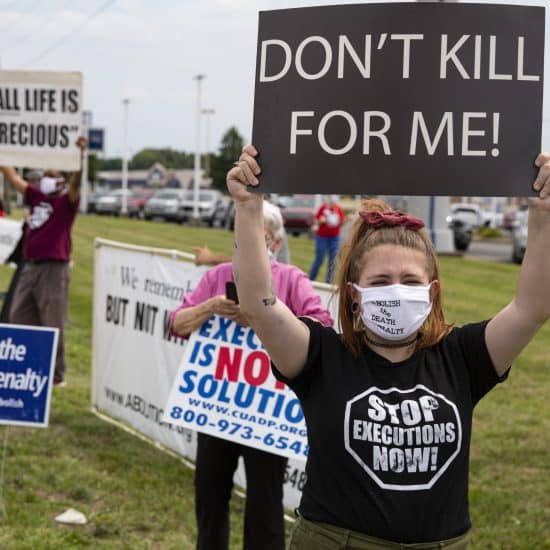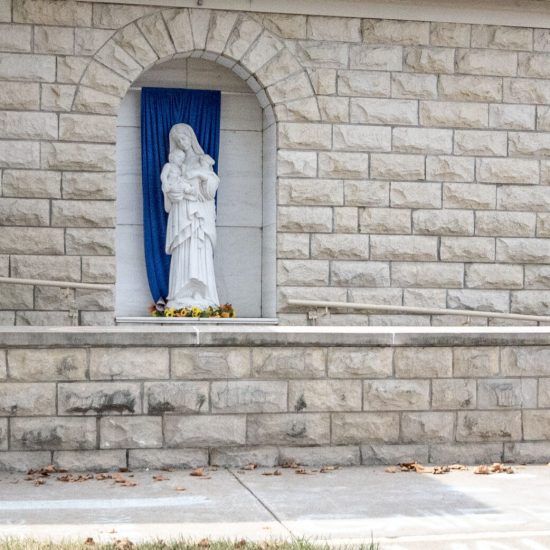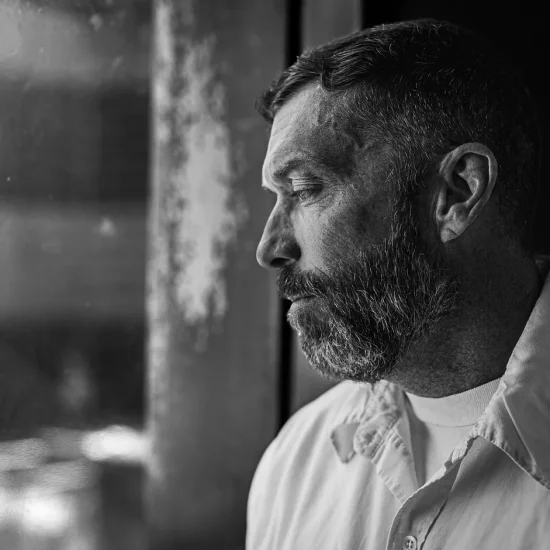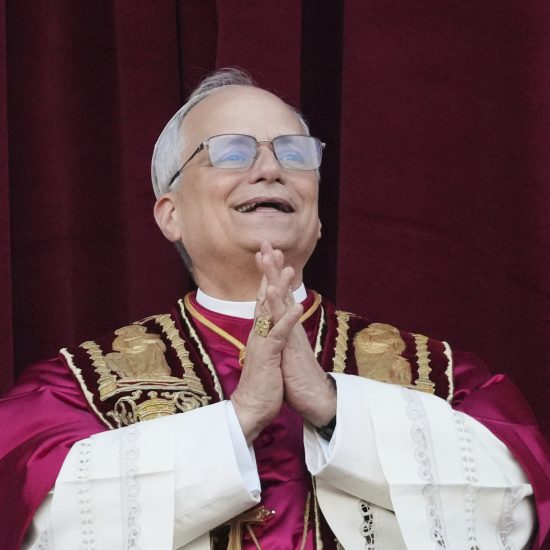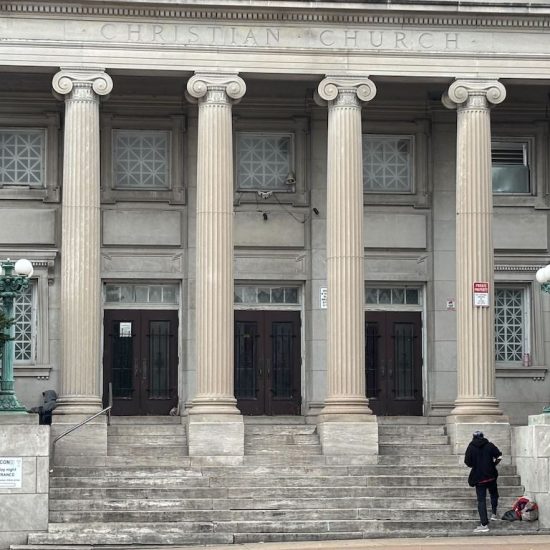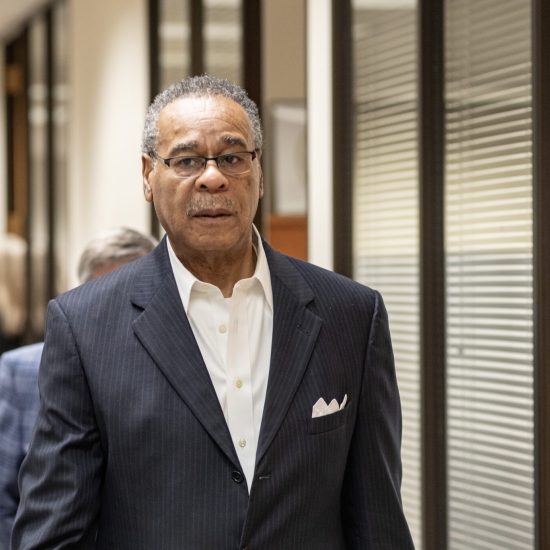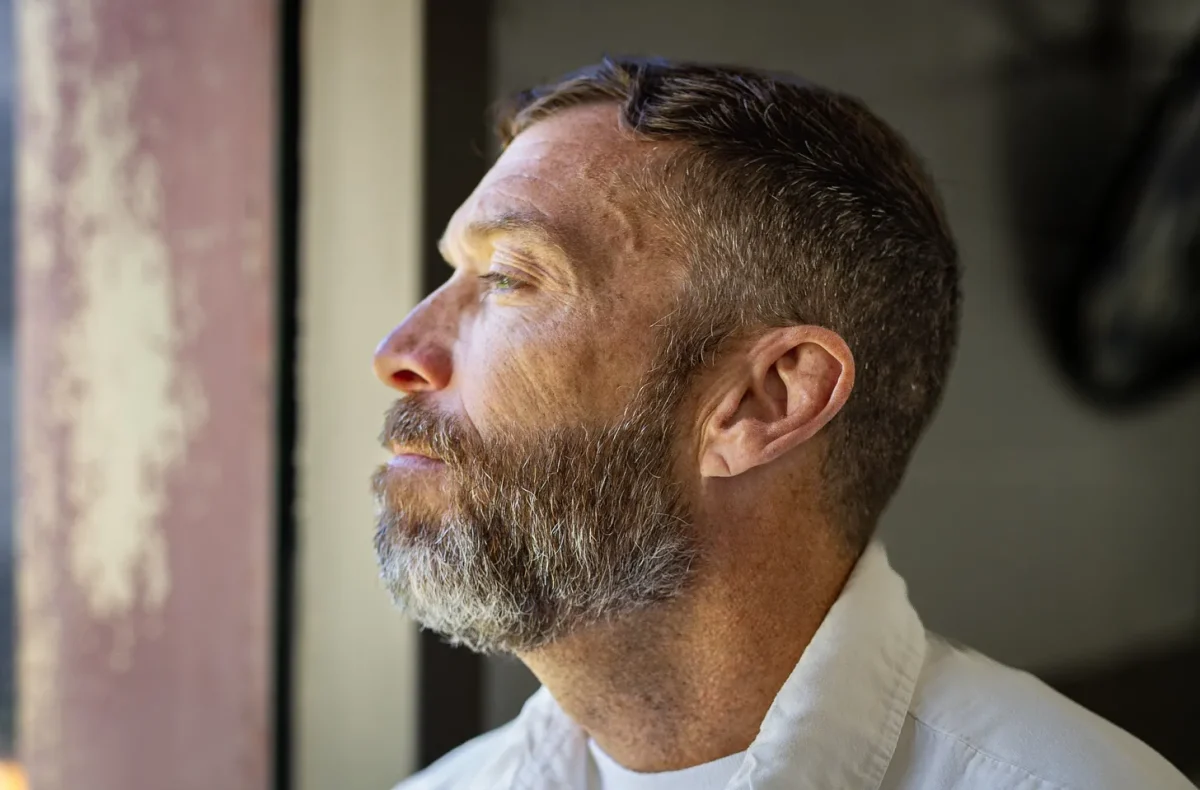
NOTE: This piece was originally published at our Substack newsletter A Public Witness.
Imagine that through a series of harrowing life events, you find yourself sent to a maximum security prison. You’re young, have never been locked up before, don’t know anyone, and have no understanding of the social landscape. Are you going to need to join a gang and get face tattoos just to survive?
But just as these worries are swirling around in your head, another incarcerated person takes you aside and helps you. He warns you about who will try to take advantage of you and even works behind the scenes to get those people to leave you alone.
He invites you to join his prison ministry — and you do because you see that he leads a group of people who genuinely look up to him. He even has two daughters on full-ride college scholarships who come to see him every weekend. This series of events not only radically changes your time in prison but also ensures you can lead a better life when you get out.
This is exactly what happened to Chris Endicott, who is now a typical family man on the outside. The person who altered the course of his life is Lance Shockley.
“[Lance] is so unapologetically himself and so good. He’s walking with God every day. Everybody respects him and leaves that alone,” Endicott said. “Even, like, guards are trying to emulate him, right? He got inmates trying to emulate him. And it’s all because he’s at peace with his Lord. He’s secure in his faith, and he’s walking it every day.”
Endicott added, “It’s a revelation to be that good of a person, to be that person, and to be able to be that person, day in and day out, in that place.”
This is just one of the many people Shockley has helped at Potosi Correctional Center. Yet, the state of Missouri is set to execute him on Oct. 14.
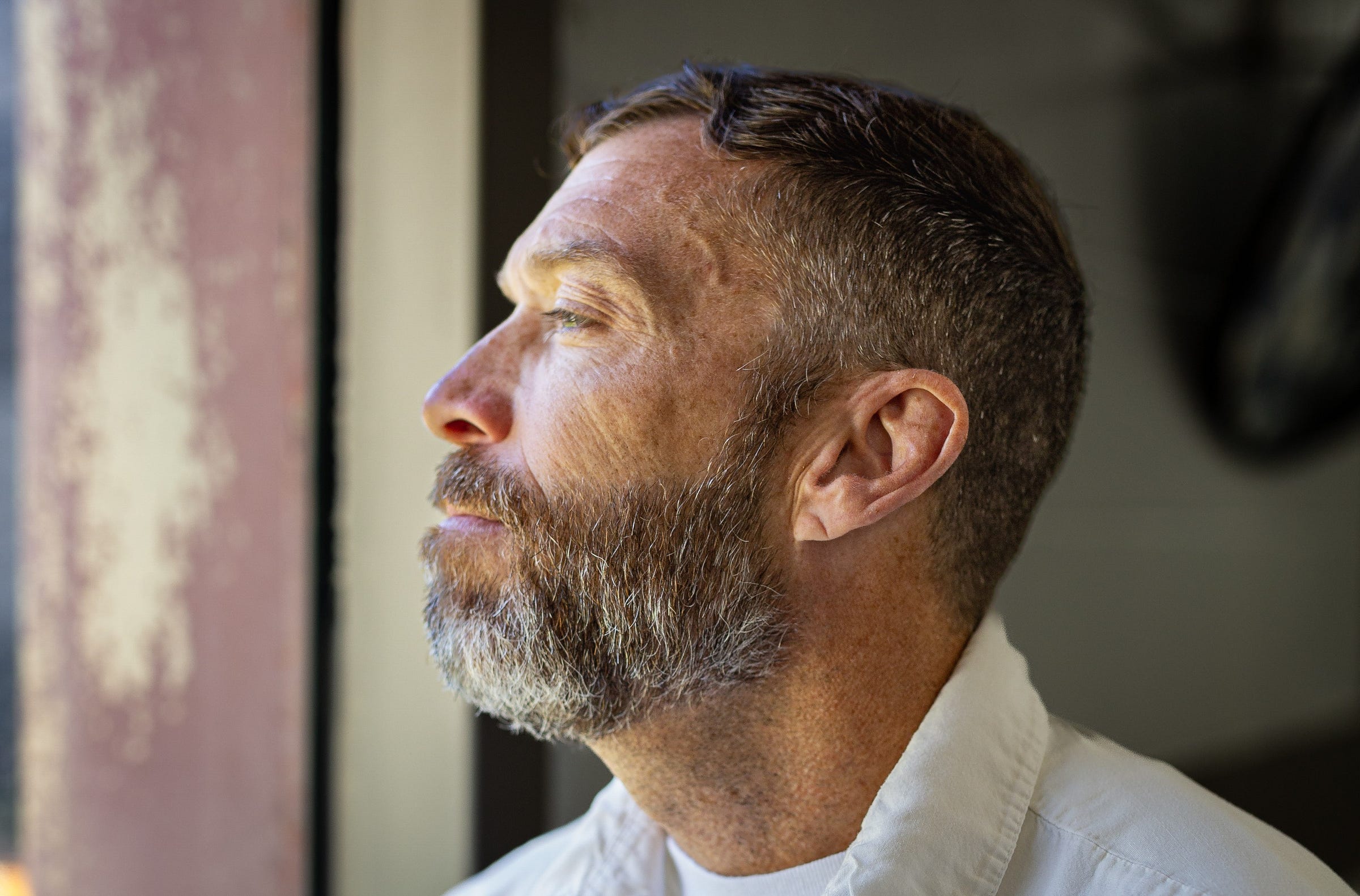
Lance Shockley. (Jeremy Weis)
Shockley was convicted of the 2005 murder of Missouri State Highway Patrol Sgt. Carl Dewayne Graham Jr. in a case rife with lingering innocence questions. For one, there is no direct evidence tying him to the crime scene. This means no fingerprints, no DNA, no weapons, and no eyewitnesses. And Shockley has maintained his innocence from the beginning.
The circumstantial case against Shockley is full of inconsistencies and conflicting claims from witnesses in Carter County, a rural area of the Missouri Ozarks that has historically suffered from drug trafficking and official corruption. Unfortunately, none of this came up during Shockley’s trial due to ineffective assistance of defense counsel. And when the jury foreperson engaged in egregious misconduct, which emerged only after the guilty verdict was reached, the defense attorneys were unable to secure a mistrial on the tainted jury deliberations.
Despite all of that, the jury that convicted him couldn’t agree on capital punishment. Because they deadlocked, Shockley was sentenced to die by the judge — something only allowed in one other state (Indiana) through a technicality in constitutional law. In every other state, a deadlocked jury results in a sentence of life without parole.
In addition to Indiana executing Roy Ward tomorrow (Oct. 10), next week had five people in five states scheduled to be killed in four days. But a Texas court just today blocked the execution of Robert Roberson planned for Oct. 16, due to a groundbreaking 2013 junk science law. So far in 2025, 34 people have been executed in 10 states, including 13 in Florida. The Sunshine State next plans to kill Samuel Smithers on Tuesday, the same day as Shockley’s execution.
The U.S. Supreme Court, the 8th U.S. Circuit Court of Appeals, the Missouri Supreme Court, and lower courts have denied nearly all paths for relief or even the use of modern DNA testing for previously untested evidence, leaving intervention from Gov. Mike Kehoe as likely the only option. So this issue of A Public Witness looks at Shockley’s extensive history of Christian leadership while in prison, as well as the role restorative justice should play in our criminal legal system.
(Disclosure: Jeremy assisted with the recording of Lance Shockley’s clemency video and his spouse is a social worker on Shockley’s legal team.)
Ministering Behind Bars
Lance Shockley isn’t just someone living on death row. He’s also a community leader and ministry volunteer helping others who are also incarcerated at Potosi Correctional Center. He has spent years ministering to his fellow prisoners and leading various initiatives.
“He’s made a huge impact,” Rob Gerst, a former chaplain at Potosi Correctional Center, said as he urged clemency for Shockley. “He’s been an example of what a friend should be. He’s an example of what a Christian should be. He’s an example of what a citizen should be. He’s an example of what a neighbor should be. He’s been an example of what all of us want in our lives and he’s doing it inside a fence.”
“He looks for opportunities to help and to serve, but I think the biggest way that I would describe Lance is he’s just giving. If Lance sees a need or if he sees something, he’s always the one to make it happen,” Gerst added. “I will thank God every day that Lance was in my life.”
For five years, Shockley served as the designated Christian representative in the prison to work with staff and outside volunteers to plan worship services, baptisms, and other special moments. A graduate of Kairos Prison Ministry International, he’s also encouraged other prisoners in the non-denominational program that seeks to build faith, community, and pro-social behavior. He gave the commencement address for those who went through the program last year.
Shockley also founded a shoe ministry where he hand-stitches repairs to shoes for prisoners in need, and he collects donations from other prisoners to give a “welcome package” of food, clothing, and toiletries for new prisoners as he also seeks to befriend them and get them connected in worship and other community activities. Additionally, Shockley served as the president (until his execution date was set) of the Restorative Justice Initiative that coordinates volunteer opportunities for prisoners, and he was hand-picked by the prison’s deputy warden to serve in the inaugural class of leaders in the Inmate Peer Support program, where they provide emotional assistance to other prisoners and help staff to de-escalate conflict.
“There’s a lot of things about the guys there that I never could understand, there’s a huge culture shift inside of there the guys experience that none of us will understand. So having somebody there who understands where they’re coming from and what they’re going through makes a huge difference,” Gerst said. “Lance was a huge part of that. Lance was always there for the guys and he had an ability to not only just help them, but because of his faith he had the ability to be able to minister to them on that level, where a staff member may not be able to.”
“He’s the only guy, including staff, who when I was having a bad time and it was visibly on my face, he’s the only guy that would come in my office and say, ‘Chap, can I close the door?’ Close the door and he’d sit down and I’d go, ‘What’s up, Lance? What do you want to talk about?’ ‘I want to talk about you. What are you doing? What’s going on? How are you doing?” Gerst added. “That meant the world to me, because here’s a guy who’s on death row … he’s preparing himself for death and here I am, just having a rough day, and he stops and looks out for me. And I’m staff. And when it’s all said and done, he’s a guy that would leave the office with a prayer.”
Others have also noted Shockley’s ministry and leadership as they urge Gov. Mike Kehoe to stop next week’s execution. Elected last November, this is the first execution scheduled during his term. The Republican, who is Catholic, has often called himself “pro-life.”
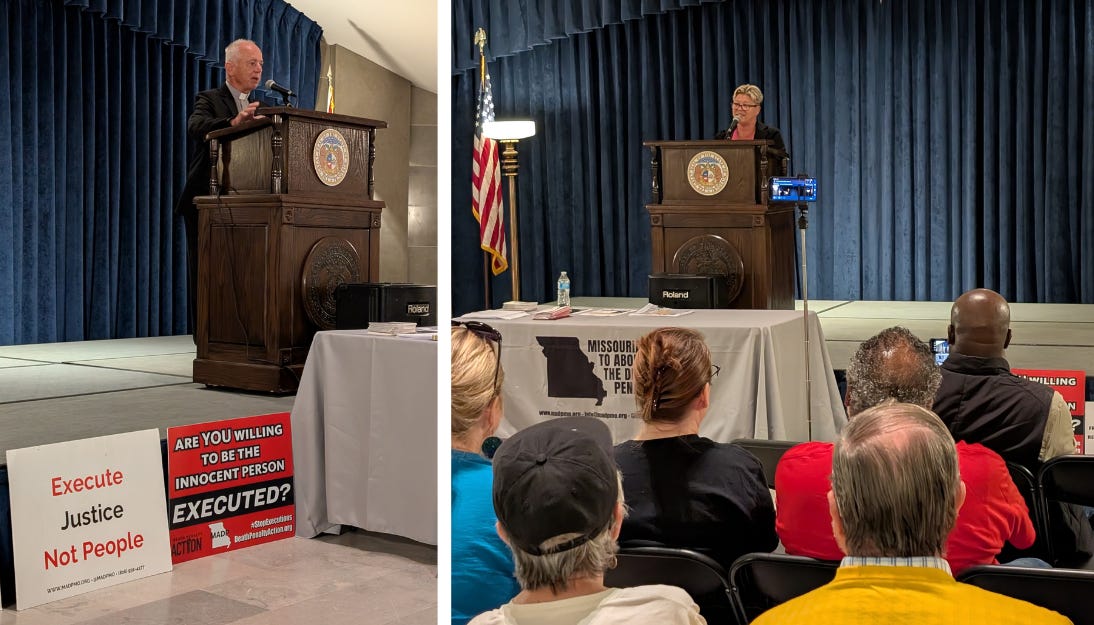
Deacon David Billing (left) and Heidi Moore (right) speak during a rally to support Lance Shockley in the Missouri Capitol in Jefferson City on Oct. 7, 2025. (Brian Kaylor/Word&Way)
During a rally at the state Capitol on Tuesday, Heidi Moore, executive director of Missourians to Abolish the Death Penalty, highlighted “the impact Lance has on the lives of others” in the Potosi prison. Before the group walked up to the governor’s office to drop off over 31,000 petition signatures from people urging Kehoe to stop the execution, Moore added, “The men at Potosi care about Lance because Lance cares about them.”
Deacon David Billing of the Catholic Archdiocese of St. Louis also spoke at the rally, highlighting the Catholic Church’s long-held position against the death penalty. He quoted from the four most recent popes, including recent remarks by Pope Leo XIV: “Someone who says, ‘I’m against abortion but I’m in favor of the death penalty,’ is not really pro-life.” He also noted the Catholic Church has chosen October as Respect Life Month.
“As a Catholic, as a Christian, as a beloved child of God, I love God and I am to love God’s creation. We are to respect the God-given dignity of each and every person, from conception to natural death,” he said. “Nothing can be gained by killing Lance Shockley, but so much will be lost. Lance is a loving father to his daughters. He’s a faith leader in his home in Potosi. And he serves as a mentor and mediator for his brother inmates. In this day and age, the death penalty makes me wonder: Why do we kill people who kill people to show that it’s wrong to kill people?”
Help sustain the journalism ministry of Word&Way by subscribing to A Public Witness!
Seek Justice, Rescue the Oppressed
Lance Shockley is someone who has, by all accounts, been personally rehabilitated during his time in prison. Despite his strong innocence claim, he was at rock bottom when he arrived in prison after a traumatic childhood and years of substance abuse. He made the decision to hand his life over to God and be fully present for everyone he came in contact with, to serve as an example of how Christianity can transform.
Shockley hasn’t been able to minister in the same ways he used to since his execution date was set and he was transferred to solitary confinement as part of his “pre-execution status.” However, he’s still ministering to others as he can from in “the hole.” In this capacity, many of the men asked Shockley if he would lead church, as they are not permitted to attend services when they are housed in administrative segregation. So he now spends a few hours a week sitting in the middle of the wing preaching, praying, and reading Scripture while his fellow prisoners sit on the floor of their cells to listen through the food ports in their doors.
“I can’t share the name of the Potosi Correctional Center official, but it’s someone that’s way up there. I was meeting with him, and he made a statement that kind of took me back, because he said, ‘If we had 800 Lances in our prison, I wouldn’t have a job,’” said Dennis Sutton, a prison ministry leader from Gracelife Chapel in the St. Louis area. “So that spoke to me as that this is who this man is.”
The Missouri Department of Corrections has a section of its website devoted to explaining its commitment to restorative justice. Whereas punitive justice is centered on punishment, restorative justice is based on principles of repairing harm, healing, and community engagement.
If the Department of Corrections is truly invested in restorative justice, then killing Shockley only serves to harm that goal. And similarly, if Gov. Kehoe is truly invested in advancing “pro-life” policies, then the state-sanctioned murder of Shockley makes no sense.
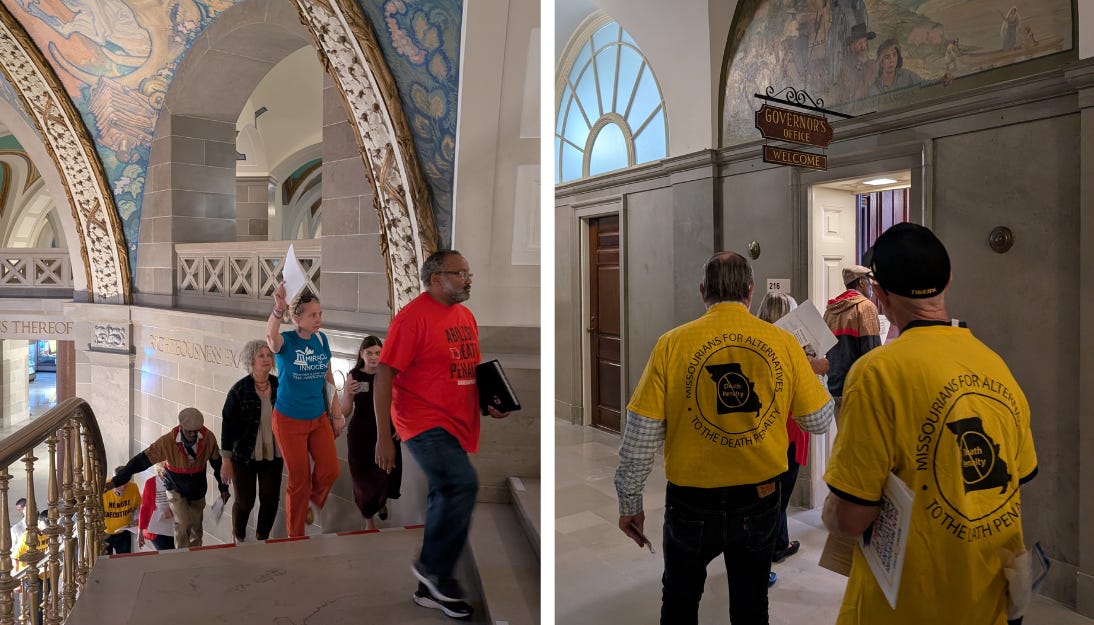
Left: Nimrod Chapel, president of the Missouri State Conference of the NAACP, leads rally participants to deliver petitions urging Gov. Mike Kehoe to stop the execution of Lance Shockley. Right: The group makes its way into the governor’s office in the Missouri Capitol in Jefferson City on Oct. 7, 2025. (Brian Kaylor/Word&Way)
There are several actions you can take if you are interested in participating in the fight for clemency. You can call or write a note to Gov. Kehoe’s office. And you can also encourage your congregation to take part in the Weekend of Prayer for Lance Shockley that will take place October 10–12 and include things like church bulletin inserts, sermon readings, and vigils.
There is a poignant section of Shockley’s clemency petition where his legal team quotes an incarcerated man and notes a theme that emerged in their interviews with people who have encountered him: “‘Prison can be a very dark and violent place and Lance is a lighthouse in stormy waters. We need people that can shed light in the darkness.’ It is striking how many people we spoke to, both inside and outside of the prison, described Lance this way.”
Let us do all we can to ensure this and other lights are not snuffed out.
As a public witness,
Brian Kaylor and Jeremy Fuzy
A Public Witness is a reader-supported publication of Word&Way. To receive new posts and support our journalism ministry, subscribe today.

